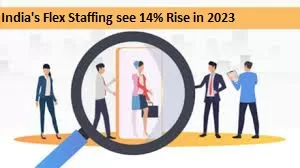According to the Indian Staffing Federation, the number of flex employees in India increased by 14% in the fiscal year 2022–2023 with the addition of 0.17 million, bringing the total workforce to 1.44 million as opposed to 1.26 million flexi workforces the year before.
However, the rate at which new flexi workers were added to the workforce year after year slowed down in comparison to the 0.22 million flexi employees who were launched during the fiscal year of ’22.
The Information Services Forum (ISF), the leading business association for the manpower outsourcing industry, claims that the growth in employment was particularly apparent in significant industries like e-commerce, logistics, manufacturing, tourism and hospitality, FMCG, consumer durables, and healthcare. The ISF also discovered that a number of factors, including an increase in the average age of workers, were responsible for the increase in employment.
In its annual report, which was released on Tuesday, it stated that “women’s participation in the flexi workforce continued to account for 24% in FY ‘2023.”
The number of new flexible roles established during the previous fiscal year includes contributions from both the general flexi staffing business and the IT flexi staffing industry, according to a statement issued by the ISF.
By the conclusion of the previous fiscal year, general flexi staffing had grown by 15.3% with the addition of 0.14 million new employment, whilst the information technology flexi staffing segment had seen a loss of 7.7% in new flexi jobs year over year. This contrasts with the 1.44 million overall flex workers employed by members of the Indian Staffing Federation.
The ISF claimed that the decline in the creation of new jobs in the IT flexi staffing sector “mirrored the global slowdown in IT hiring and the ongoing process of employment right-sizing across markets.”
The International Staffing Federation (ISF) reports that flex positions increased by 0.4% in the fourth quarter of 2023 (January to March). Industries including FMCG, E-commerce, manufacturing, and healthcare, among others, generate demand for employment in general flexi staffing. On the other hand, throughout the course of the most recent quarter, IT flexi staffing decreased by 6%.
Suchita Dutta, executive director of the Indian Staffing Federation, claims that “over the past financial year, the Indian staffing industry provided a significant number of first-time job market entrants with their very first formal employment opportunity.” The Indian staffing market “provided a significant number of first-time job market entrants with their very first formal employment opportunity over the past financial year.”


 WhatsApp us
WhatsApp us